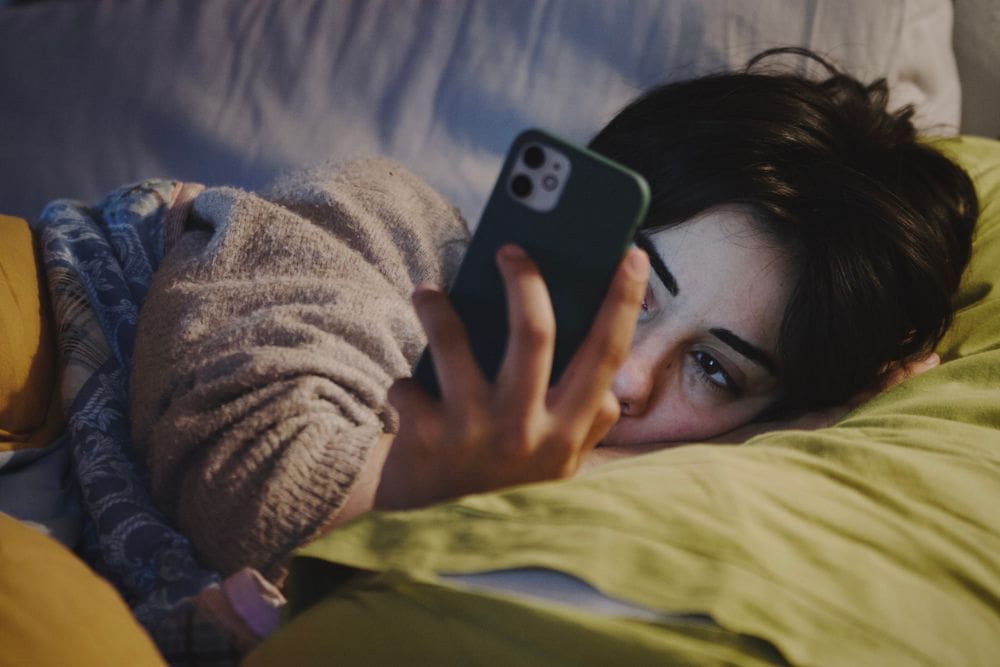It’s 2 a.m. You can’t sleep. You’re scrolling through TikTok when a video pops up: a young therapist in a cozy hoodie, explaining anxiety in 30 seconds. Her tips sound helpful—so you keep scrolling. Soon, you’ve watched dozens of “therapist reacts” clips, quick coping strategies, and self-care checklists.
It feels like free therapy in your pocket. But is it really?
“TikTok therapists” have made mental health conversations more visible than ever. For many, these videos are the first time they’ve heard about conditions like anxiety, bipolar disorder, or depression in a way that feels relatable. Still, quick-hit advice isn’t the same as professional, personalized care.
The Appeal of Social Media Therapy Content
Social media sites like TikTok can make mental health information feel more accessible. You get advice from someone who seems friendly, authentic, and maybe even shares your struggles. You don’t need to make an appointment, travel, or talk to a stranger. It’s quick, convenient, and private.
This accessibility matters. Many people start therapy later than they’d like simply because they’re unsure what to expect or fear being judged. Seeing therapists speak openly online helps reduce stigma. You might even recognize symptoms in yourself that encourage you to seek help.
At Raleigh Oaks Behavioral Health, we see three main benefits to TikTok therapy content:
- Normalizing mental health care. TikTok content can make therapy feel less intimidating.
- Quick exposure to coping tools. Learning about breathing exercises, grounding techniques, and reframing strategies can be immediately useful.
- Increased awareness. Viewers learn that what they’re experiencing may have a name—and that help is available.
Where Oversimplification Becomes Risky
It’s great if TikTok helps to start the conversation about improving your mental health, but the danger comes when short videos become your primary (or only) source of help. A video can’t diagnose you, replace a personalized treatment plan, or track your progress or adjust strategies when life changes.
When mental health advice is condensed for entertainment, important details inevitably get left out. This can lead to:
- Self-diagnosis without context. A person might watch a video on ADHD symptoms, identify with a few points—like difficulty focusing or feeling restless—and assume they have the condition. Without a professional evaluation, they may overlook other possible explanations, such as anxiety, sleep deprivation, or even thyroid issues. This can delay proper treatment and create unnecessary worry.
- Generic advice that misses the mark. A grounding technique, such as naming five things you see in the room, might help some people with anxiety regulate their nervous system. But for others—especially trauma survivors—this exercise could feel ineffective or even triggering if not adapted to their needs.
- Minimizing serious issues. Depression, PTSD, or bipolar disorder are complex and often require a combination of therapy, medication, and lifestyle adjustments. A “three-step morning routine” video might inspire healthy habits, but it risks oversimplifying what it takes to manage these conditions effectively.
- Confusing symptom overlap. Many mental health conditions share symptoms. For example, difficulty concentrating could point to ADHD, depression, anxiety, or a trauma-related disorder. Without a trained professional to assess the full picture, people may latch onto the wrong label and make it harder to get the right help.
- Promoting quick fixes over long-term strategies. Some videos focus on “instant” results—like a hack to stop a panic attack—without explaining that building resilience takes ongoing effort and practice. Viewers might feel discouraged when the tip doesn’t “work” right away or decide that medications like antidepressants won’t work for them at all.
- Triggering emotional responses without support. Discussions of trauma, self-harm, or abuse can stir up intense emotions. In a therapy session, a professional can guide you through these feelings in a way that doesn’t put your long-term well-being at risk.
- Overlooking cultural and personal differences. A coping tool that works well for one group may not fit another due to cultural values, religious beliefs, or personal history. Without this context, advice can feel irrelevant—or worse, alienating.
- Inadvertently reinforcing stigma. Even well-meaning creators can unintentionally present mental health in a way that stereotypes certain conditions. For example, portraying OCD as only about cleanliness ignores the reality of intrusive thoughts and compulsions unrelated to tidiness.
The Real Work of Healing: Why Professional Support Matters
Short videos can plant seeds, but therapy helps those seeds grow. A professional can do what TikTok can’t:
- Identify patterns and root causes of your struggles. A trained therapist will take the time to uncover your personal history, life experiences, and any underlying conditions—whether that’s unresolved trauma, chronic stress, or a combination of factors—that contribute to how you feel today. Understanding the “why” is essential to creating lasting change.
- Offer a safe, judgment-free space for your full story. In therapy, you can share without fear of being misunderstood, criticized, or rushed. Your therapist’s role is to listen deeply, validate your experiences, and help you process difficult emotions in a way that feels safe and manageable.
- Provide coping tools tailored to your needs. While a viral video might share a quick breathing exercise, a professional can assess whether that tool fits you—and if not, introduce alternatives. For example, someone with PTSD might benefit from grounding exercises that focus on physical sensations, while someone with depression might need tools that target motivation and energy. This customization is the difference between temporary relief and sustainable progress.
- Adjust strategies as your life changes. Mental health is not static. What works for you during a stressful work project might not help during a grief-filled season or a major life transition. A therapist can help you adapt your coping strategies over time.
Your mental health deserves the full story—not just the highlight reel. At Raleigh Oaks Behavioral Health in Garner, North Carolina, our compassionate team can help you move beyond surface-level solutions to create a personalized plan for lasting well-being. Reach out today for a free, confidential assessment.





